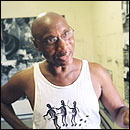Routes to Recovery
AUGUST 25, 2007 Listen to this Story

- American Routes
- View the Slideshow
Web Resources
This weekend, residents of New Orleans are still rebuilding after Hurricane Katrina. It's been two years since the Category Five storm and American Public Media's documentary unit, American Radio Works, takes listeners into the culture of New Orleans. The documentary is called "Routes to Recovery" and one of the hosts is Nick Spitzer, from the public radio show "America Routes."Weekend America Host Bill Radke talks with Spitzer about how culture is a vehicle to help New Orleans recover.
---
How did you go about documenting the cultural life of New Orleans today?
We really looked especially at people who expressed the culture in a special way. We talked to a cooks and restaurateurs, musicians, Mardi Gras celebrants, craftsmen who rebuilt the landscape, that is a special landscape, if you've ever seen New Orleans. And we treated them kind of as the model citizens, who were connected to the past but who also are looking to create a future that has some kind of continuity
How much despair versus optimism are you sensing?
On the whole, the people who are back here increasingly feel better. They're back, they're making something happen. But that doesn't mean there aren't some terribly sad things around us all the time that we're trying to cope with. Particularly the fact that 40 to 50 percent of the people have not yet returned and that doesn't make for a city as we knew it.
As you say, a lot of New Orleanians have not returned. Another result of Hurricane Katrina has been an influx of out-of-towners coming: to move in, to volunteer, to clean up, to give aid. How has that influx affected the city?
Overall it's been very positive. Any group of people has their up-and-down in what they're trying to do. There have been charges that some of the folks from out of town come here, naive, wanting to do good and don't understand the local cultural scene. The reverse of that is that New Orleans has historically been a very closed society to out of town people. But it's a dialogue and a lot of very talented people lived here to begin with, and a lot of great people are arriving.
And I think it's very important to getting us to the future to have of this new blood in town.
Here's some tape from the documentary of you talking with a visual artist for New Orleans named Willie Birch about bringing back civic pride and about do-gooders:
"What has been happening: we've been having a lot of whites come in and clean up. But what I found is that the kids weren't responding. They say, "Well, you know, we were slaves so therefore it's just payback." But when Mr. Willie come out here and clean in front of your house... people didn't know what to do. And so finally those kids crossed the street. They came out and they got the bags, and then the momma came out and then the lady here came out. That makes a difference."
How typical or how rare example was that, of people bringing back civic pride New Orleans?
I think is pretty common in lots of different kinds of people in all their own walks are doing that. I don't think he's so much putting down the outsiders, as saying that for the local kids to get engaged they do need somebody from within to make it happen. It can't be done for them.
Here's some more tape from the documentary: You are a surveying the New Orleans pianist Henry Butler's house with him. When did this happen?
It just happened back in the late spring and Henry Butler is blind since a very early age. He's an old friend of mine and his displacement from New Orleans is particularly poignant because he had his house all set up for a non-sighted person and now all the walls are blown out and he's been living in Denver, Colorado, which it looks like he's going to stay there for the duration until something radically changes back home in New Orleans
"For me it's harder to distinguish rules was room was what because all the walls are gone, and you can see the piano over there. It's just a frame pretty much. And the keys are just sitting there. You can just pick 'em up."
"After spending 21, 22 years with this piano, and making it my piano, it's like my baby, it's like the thing that got me to where I am... "
And he's kept that piano there?
It has remained there. I think he's been uncertain what to do with it. Some larger instruments have literally been pitched on the sidewalk. I would add that as much as we may have lost something material, it's the intangible things that we have to recover: our relationships to people and places, and our relationship to musical performance, and great local cuisine, and all these kind of things
Some say there is no water line on music. There is no water line on the spirit or the soul.







Comments
Comment | Refresh
Post a Comment: Please be civil, brief and relevant.
Email addresses are never displayed, but they are required to confirm your comments. All comments are moderated. Weekend America reserves the right to edit any comments on this site and to read them on the air if they are extra-interesting. Please read the Comment Guidelines before posting.
You must be 13 or over to submit information to American Public Media. The information entered into this form will not be used to send unsolicited email and will not be sold to a third party. For more information see Terms and Conditions and Privacy Policy.